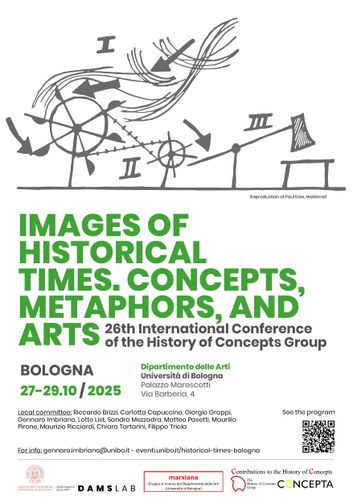The Conference

The 26th International Conference of the History of Concepts Group (HCG) will take place in Bologna, hosted by the Department of the Arts of Bologna University (October 27th-29th 2025).
‘Conceptual history’ names a broad approach to intellectual history which seeks to unfold concepts by placing them in their historical context and mapping their relationship with social history. Yet even such terms as ‘history’ and ‘historical time’ have their own history and thus are not immediately available to us as analytical concepts. If the fall of the Soviet Union made an ‘end of history’ seem plausible in the final years of the past millenium, today’s tectonian shift in global power relations as well as the very real possibility of a planetary ecological breakdown force us to reconsider our conception of the course of history. Conceptual history and intellectual history, as well as history of the arts and sciences, should thus come together to rediscover the images and imaginaries of history in the annals of the past, in order to enlighten our present.
Historical research is always itself historically situated. In order to gain a critical reflective perspective on its own position of observation, conceptual history must investigate not just concepts in history, but also the core concepts on which it relies. How we ‘do’ history depends on what we understand by ‘History’, the object of historical research. In the modern period, the concept of history is defined by its place in a constellation with other concepts such as ‘progress’, ‘emancipation’, ‘enlightenment’, ‘civilisation’, ‘development’, ‘globalisation’, and more. The notion of a universal history of mankind came to play a political role, both in humanist projects of progress and equality, and in colonial projects for the submission of global history under a European hegemony. History has been conceptualised as universally progressing along a single unidirectional line of development, along which different countries and regions could be ordered into different stages from primitive to civilised. In such large scale projects, the notion of history was both influenced by and in turn influencing political agendas. The political implications inherent in concepts of time and history have long been recognised by scholars within such fields as critical theory, Marxism, postcolonial studies, and critical strains of intellectual history. Postcolonial theory has criticised the stagiest and Eurocentric understanding of a necessary course in history, advancing instead visions of multiple temporalities.
Likewise, how we understand history relates to how we conceptualise time: From notions of circular time in classical antiquity, through Christian eschatological visions of an end to human time, to modern scientific concepts of absolute time derived from Newtonian physics. Time may be conceptualised as a measure of movement, as change, as subjective or objective, as singular and linear or multiple and complex. It may be understood as a container for historical events, or, on the contrary, as something given by and through these events. And the time of history may be experienced as accelerating, repeating itself, or coming to a halt. In studying conceptual constellations regarding ‘history’, conceptual and intellectual history must therefore pay close attention to the way historical time is imagined, its motivations and ideological stakes.